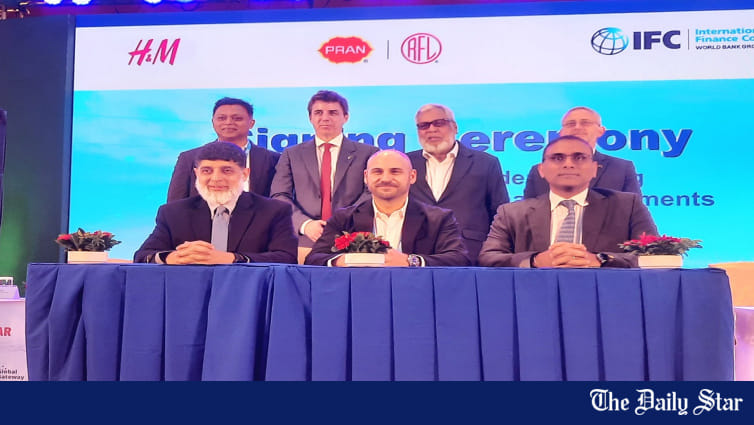Saif
Senior Member
- Joined
- Jan 24, 2024
- Messages
- 15,397
- Reaction score
- 7,874
- Nation

- Residence

- Axis Group


Govt should hold power-sector foul players to account
TWO major coal-run power plants — the Rampal power plant owned by a joint venture of Bangladesh’s state-owned Power Development and India’s state-owned National Thermal Power Corporation and the Payra plant owned by a joint venture of...
 www.newagebd.net
www.newagebd.net
Govt should hold power-sector foul players to account
30 March, 2025, 00:00
TWO major coal-run power plants — the Rampal power plant owned by a joint venture of Bangladesh’s state-owned Power Development and India’s state-owned National Thermal Power Corporation and the Payra plant owned by a joint venture of Bangladesh’s state-owned North-West Power Generation Company Ltd and China’s state-owned China National Machinery Import and Export Corporation — having blown up their bill by Tk 41.25 billion, as a Power Development Board assessment has found, is worrying. Rampal, owned by the Bangladesh-India Friendship Power Company Ltd, has inflated the bill by Tk 24.78 billion for the 2024 financial year and Payra, owned by Bangladesh-China Power Company, by Tk 15.34 billion for the period of May 2020–June 2023. The overbilling was found when the Power Development Board prepared the assessment in September–November 2024 after the Awami League, which had governed the country in an authoritarian manner for more than a decade and a half, was overthrown in a mass uprising in August that year. There had been no objective evaluation of the financial deals of the power plants during the Awami League’s tenure, when 124 power plants were set up, all in an unsolicited manner.
Eighty-seven privately-owned and two joint-venture power plants, involving the state-owned Power Development Board, were set up during the tenure of the Awami League that have burdened the power board with an overall loss of more than Tk 860 billion. Energy experts say that the findings show how deep the root of financial scams in the power sector is. The case is more serious with private power plants as the producers have had a free rein to do what they liked during the Awami League’s tenure. The Power Development Board on November 21, 2024 notified Bangladesh-India Friendship Power Company of eight discrepancies in its 2023–2024 financial account. The over-billing includes a mismatch of Tk 8.86 billion in energy payment and a mismatch of more than Tk 5.63 billion in return on equity. Bangladesh-China Power Company has submitted an audited account of Tk 218.66 billion in capacity and energy payment for three years since the power plant’s initial operation began on May 15, 2020. The billing demanded more than Tk 75.22 billion in capacity payment, which the power board finds to have been blown up by more than Tk 13.33 billion. Such over-billing appears to have strained the power sector.
The government should, therefore, hold to account the quarters within and outside the public agency for the over-billing in the cases at hand. It should also investigate cases of other power producers to see if there are any issues therein. Finally, it should put in place a mechanism to stop recurrence of such malpractice.
30 March, 2025, 00:00
TWO major coal-run power plants — the Rampal power plant owned by a joint venture of Bangladesh’s state-owned Power Development and India’s state-owned National Thermal Power Corporation and the Payra plant owned by a joint venture of Bangladesh’s state-owned North-West Power Generation Company Ltd and China’s state-owned China National Machinery Import and Export Corporation — having blown up their bill by Tk 41.25 billion, as a Power Development Board assessment has found, is worrying. Rampal, owned by the Bangladesh-India Friendship Power Company Ltd, has inflated the bill by Tk 24.78 billion for the 2024 financial year and Payra, owned by Bangladesh-China Power Company, by Tk 15.34 billion for the period of May 2020–June 2023. The overbilling was found when the Power Development Board prepared the assessment in September–November 2024 after the Awami League, which had governed the country in an authoritarian manner for more than a decade and a half, was overthrown in a mass uprising in August that year. There had been no objective evaluation of the financial deals of the power plants during the Awami League’s tenure, when 124 power plants were set up, all in an unsolicited manner.
Eighty-seven privately-owned and two joint-venture power plants, involving the state-owned Power Development Board, were set up during the tenure of the Awami League that have burdened the power board with an overall loss of more than Tk 860 billion. Energy experts say that the findings show how deep the root of financial scams in the power sector is. The case is more serious with private power plants as the producers have had a free rein to do what they liked during the Awami League’s tenure. The Power Development Board on November 21, 2024 notified Bangladesh-India Friendship Power Company of eight discrepancies in its 2023–2024 financial account. The over-billing includes a mismatch of Tk 8.86 billion in energy payment and a mismatch of more than Tk 5.63 billion in return on equity. Bangladesh-China Power Company has submitted an audited account of Tk 218.66 billion in capacity and energy payment for three years since the power plant’s initial operation began on May 15, 2020. The billing demanded more than Tk 75.22 billion in capacity payment, which the power board finds to have been blown up by more than Tk 13.33 billion. Such over-billing appears to have strained the power sector.
The government should, therefore, hold to account the quarters within and outside the public agency for the over-billing in the cases at hand. It should also investigate cases of other power producers to see if there are any issues therein. Finally, it should put in place a mechanism to stop recurrence of such malpractice.




